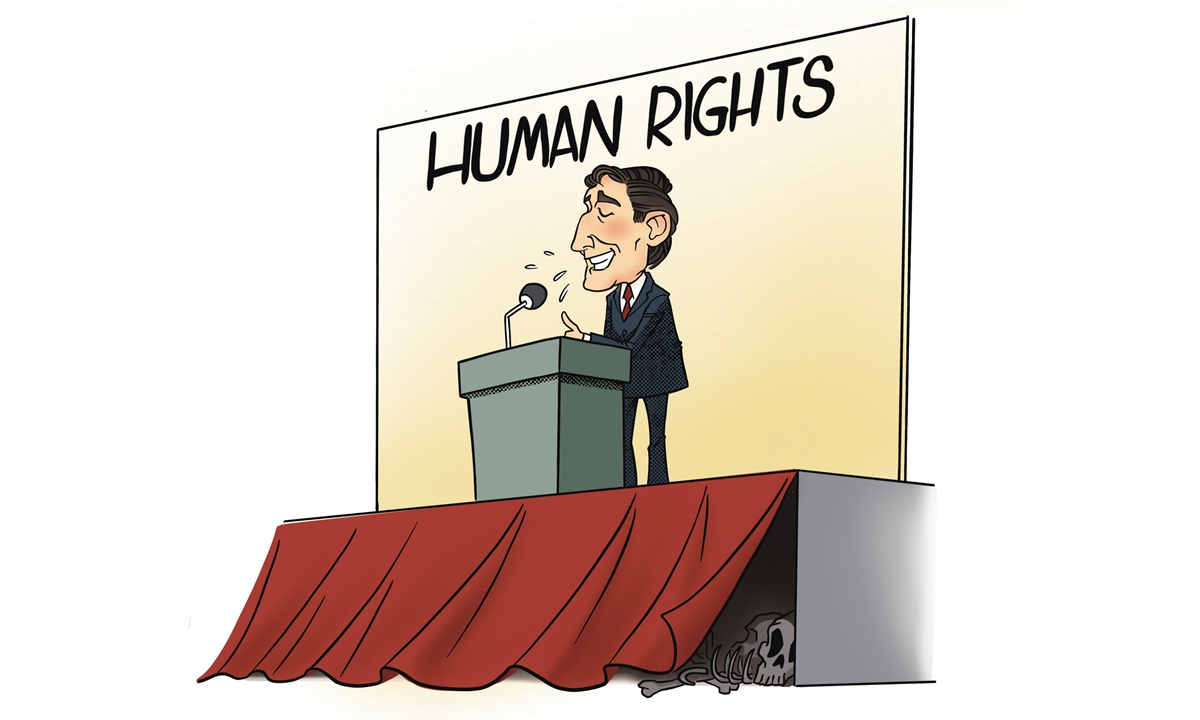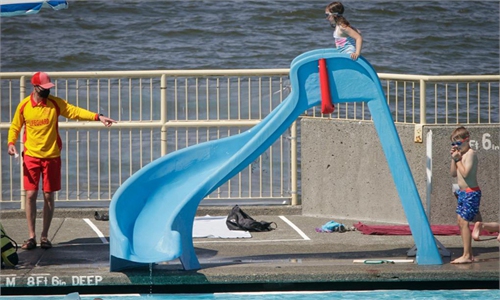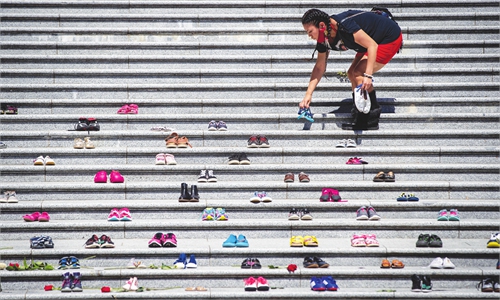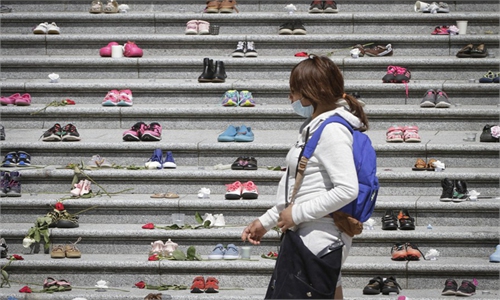
Illustration: Liu Rui/GT
Last week, the remains of 215 indigenous children were found buried in British Columbia, Canada.The remains, which were found as a result of ground penetrating technology, were in a mass, unmarked grave on the grounds of the former Kamloops Indian Residential School in Kamloops, British Columbia.
Starting in the 19th century, and continuing until as recently as the 1970s, the Canadian government created and supported a series of publicly funded residential schools across the country. More than 150,000 indigenous children were forced from their families and sent to these institutions over that period, where they were forcibly assimilated into Anglo Saxon religion and culture.
The children were forcibly converted to Christianity, banned from speaking their local languages, subjected to severe torture and abuse, and thousands are estimated to have died at the hands of the residential school system.
It is true that the government of Canada under then prime minister Stephen Harper formally apologized to the country's native population in 2008, and acknowledged the horrors which took place under the government's watch. That same year, the federal government created the Truth and Reconciliation Commission of Canada, with the stated goal to document the horrors and continued consequences of the residential school system.
And today, although the residential schools have been closed for about 50 years, their impact remains. A 2018 report by CBC News found that adults who had lived at a residential school when they were children were more likely to commit suicide and become addicted to alcohol and drugs.
Even more disturbing, the impact of residential schools has been found to have continued from one generation into the next. "One in four teenagers on reserve who had a parent who attended a residential school had considered suicide, compared with one in 10 teenagers who didn't have a parent or grandparent attend," the CBC article reports.
But despite the Canadian government's formal apology and creation of the Truth and Reconciliation Commission more than a decade ago, in many ways, very little has been done to actually undo the lasting consequences of the residential school system on Canada's more than one million estimated native citizens.
Canada has a "long standing treatment of Indigenous peoples as subhuman, without basic human rights," wrote Mary Ellen Turpel-Lafond, a law professor at the University of British Columbia, in an article in the Globe & Mail newspaper on Sunday
"As individuals, Indigenous peoples have faced racism, stereotyping, disproportionate harm and violence at the hands of the state, even as it closed off social and economic opportunities. As collectives, Indigenous peoples have endured the dismantling of their government and legal systems, the outlawing of aspects of their culture and society, and attacks on their family systems," Turpel-Lafond continued.
Clearly, then, Canada's apologies notwithstanding, Indigenous peoples in the country, both as individuals and as a collective, continue to face widespread persecution and assault on their identities, to say nothing of the continued physical harm and addiction many face.
Canadian Prime Minister Justin Trudeau often is fond of saying, is a "country of the rule of law," and he needs to start putting more action, and less rhetoric, into Canada's continued ill treatment of its native peoples.
One could perhaps be forgiven for thinking that Canada, with its long and disgraceful history regarding its own indigenous citizens, would be inward focused when it comes to human rights cases. But somehow, despite the country's continued failure to properly address the rights of one million of its own citizens, the Canadian government continues to prioritize widespread criticism of other countries, around the globe.
There is a common proverb originating in Europe, "those who live in glass houses should not throw stones," meaning that until one has gotten their own affairs in order, they should not seek to criticize others. But Canada's government, unfortunately, seems convinced that hypocrisy is a virtue. Trudeau, criticized by some as a "virtue signaller" - that is, using rhetoric and little more to address societal problems - must take a serious look inward at the treatment of his own country's native peoples before he campaigns on spreading the values of Canada around the world. The hard work of taking care of his own people is no small task, and every day which Trudeau spends self-righteously bragging about his own liberal bona fides, while continuing to ignore at best, and perpetuate at worst, the continued assault on native peoples, is a tragic and avoidable error.
The author writes about relations between China & the West. opinion@globaltimes.com.cn



